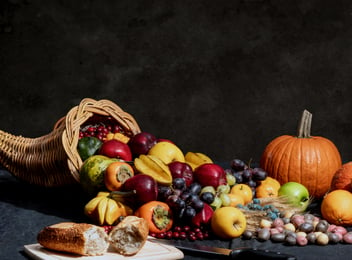Editor’s note: In addition to this article on the practice and benefits of gratitude, we’ve put together this guided meditation (LINK TO YOUTUBE VIDEO), led by this week’s author, Edie Raphael. Edie is a wonderful guide for these sessions and we know this meditation will be a valuable resource both for the holiday and in the future. Enjoy.
-------
Chance are high that on Thursday, you’ll find yourself sitting down to a meal of turkey, stuffing sweet potatoes, cranberry sauce and pumpkin pie. After the meal, you may feel sleepy or just full (possibly regretful?). But how about grateful?
Sometimes we forget the “thanks” in Thanksgiving, and that’s a shame because gratitude is like an emotional superfood. Gratitude engages us in a process of rewiring how we think and heightens our emotional well-being in numerous ways (**See the list at the end of this article for a small sampling). And one way to understand how gratitude rewires the brain is to start with the word itself. Gratitude means acknowledging the good. In fact, the Hebrew word for gratitude is Hakarat ha’tov — which literally translates to “looking for the good.” Gratitude shares the same latin root (gratia) with the word “grace” and is the basis for the word for “thanks” in Spanish (gracias) and Italian (grazias).
When we make a practice out of looking for the good, we begin to train our mind to see goodness in the world. For instance, Richard A. Emmon (one of the world’s leading researchers on gratitude) led a study in which people followed a three-week plan of actively expressing gratitude. Participants were interviewed at the end of the study and reported they:
- had fewer visits to the doctor than the general public (a sign of being healthier)
- were more optimistic (felt better about their direction in life)
- were more likely to exercise
- slept better and felt more rested
- were more determined (to pursue what they wanted and needed)
- were more attentive/mindful (paid more attention to the goodness in life; gratitude begets gratitude)
- were less depressed and anxious
In view of those fantastic benefits, here’s a Rewire starter guide to bring more gratitude into your world:
- Keep a Gratitude Journal. Every night or morning, spend a few minutes writing a list of three to five things for which you feel grateful.
- Make it a weekly practice to write 2-3 thank you notes (handwritten is better for a number of reasons, but if the hurdle of taking out paper and pen is too much, then at least send an email)
- Pray and say thanks for the many little blessings throughout the day—waking up, before meals, after meals, when you arrive back home, when you turn on lights, when you get a call, email or text from someone you care about, pleasant smells, tastes, etc. In Judaism, there’s even a blessing to recite after you use the bathroom to express appreciation that your internal plumbing is working correctly. That might sound like too much, but it drives home the point that no blessing is too small to ignore.
- The morning practice: We’ve got a guide for this as well, and morning gratitude sessions are a fantastic way to set the tone for the day. Spend ten minutes in the morning in quiet acknowledging your gratitude for your breath, good health and the comforts life has afforded you.
Chances are you have your own family tradition of saying thanks on special occasions such as Thanksgiving. Living a life with gratitude puts us in the posture of making every day of life a special occasion
One last point about the Thanksgiving holiday and gratitude: Sometimes getting together with family is not completely joyful. It can be a lot of work entertaining folks. We may have relatives who are argumentative or critical. But there’s still an important place for gratitude practice even in challenging moments. Perhaps amid the noise and fuss, you can find appreciation for the chaos of the holiday as it increases your appreciation for the order you have the rest of the year. My grandmother referred to this dynamic as “getting lemons and making lemonade” but if you’ve ever tasted unsweetened cranberries, you can easily give this a Thanksgiving theme: “getting cranberries and making cranberry sauce.”
All of us at Rewire wish you and your family a peaceful and thankful Thanksgiving.
-=-=-=-=-=-=-=-=-=-=—=-=-=-
**A small sampling of easily-accessible articles from the past few years which explain the power of gratitude to rewire the brain for profound and lasting positive change:
- See these 7 awesome benefits in this Forbes aritcle. http://www.forbes.com/sites/amymorin/2014/11/23/7-scientifically-proven-benefits-of-gratitude-that-will-motivate-you-to-give-thanks-year-round/#64c1e9f36800
- Evidence that gratitude practice rewires the brain in Inc. http://www.inc.com/jessica-stillman/the-amazing-way-gratitude-rewires-your-brain-for-happiness.html
- Four studies which reveal more incredible benefits in Psychology Today. https://www.psychologytoday.com/blog/prefrontal-nudity/201211/the-grateful-brain
- Some further discussion and explanation on gratitude studies from earlier this year in New York Magazine. http://nymag.com/scienceofus/2016/01/how-expressing-gratitude-change-your-brain.html
- Here’s an older study which shows the power of gratitude journalling from the Huffington Post. http://www.huffingtonpost.com/ocean-robbins/having-gratitude-_b_1073105.html
- For some more suggestions on how to cultivate gratitude look at this Harvard Health article. http://www.health.harvard.edu/newsletter_article/in-praise-of-gratitude




